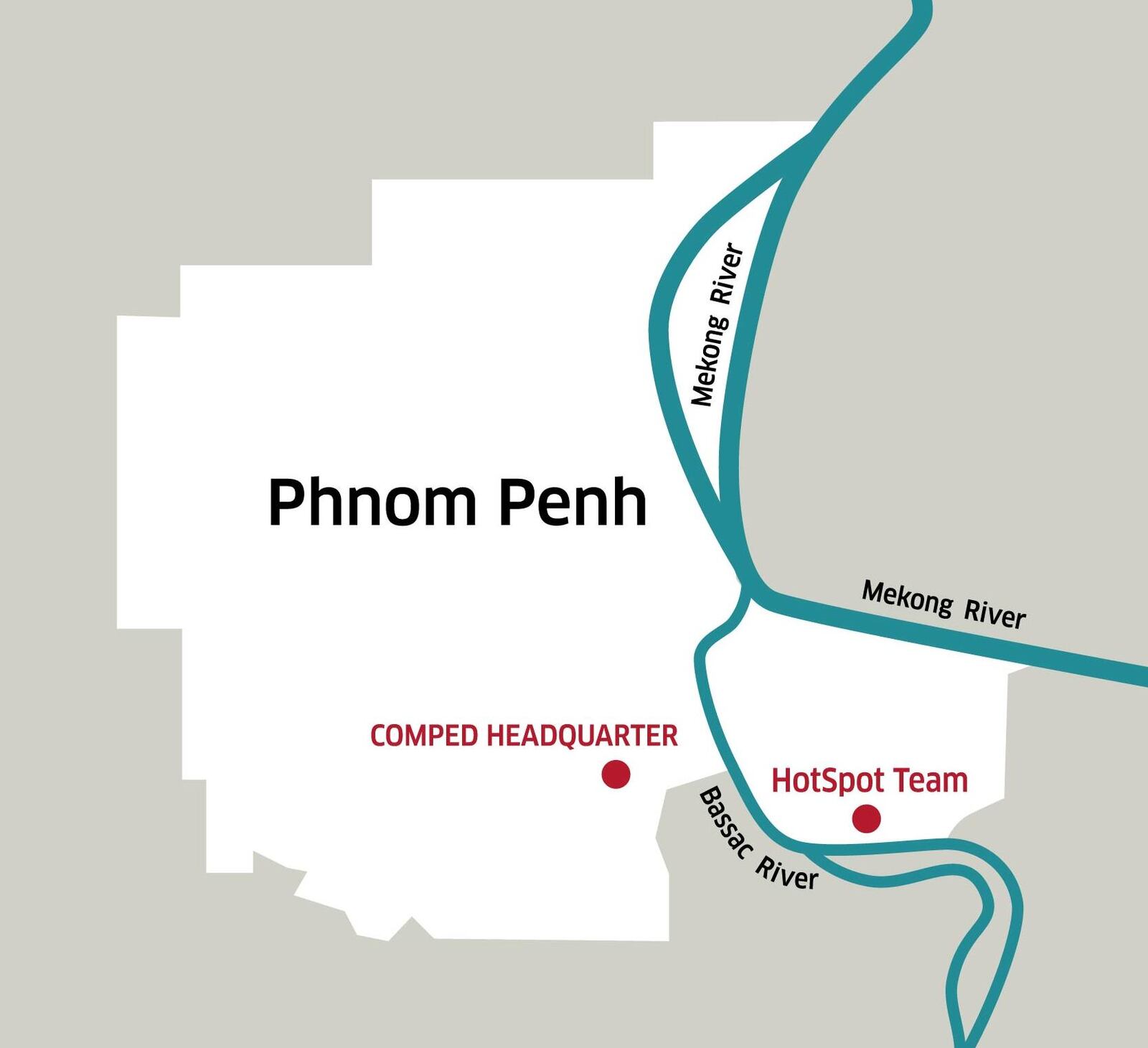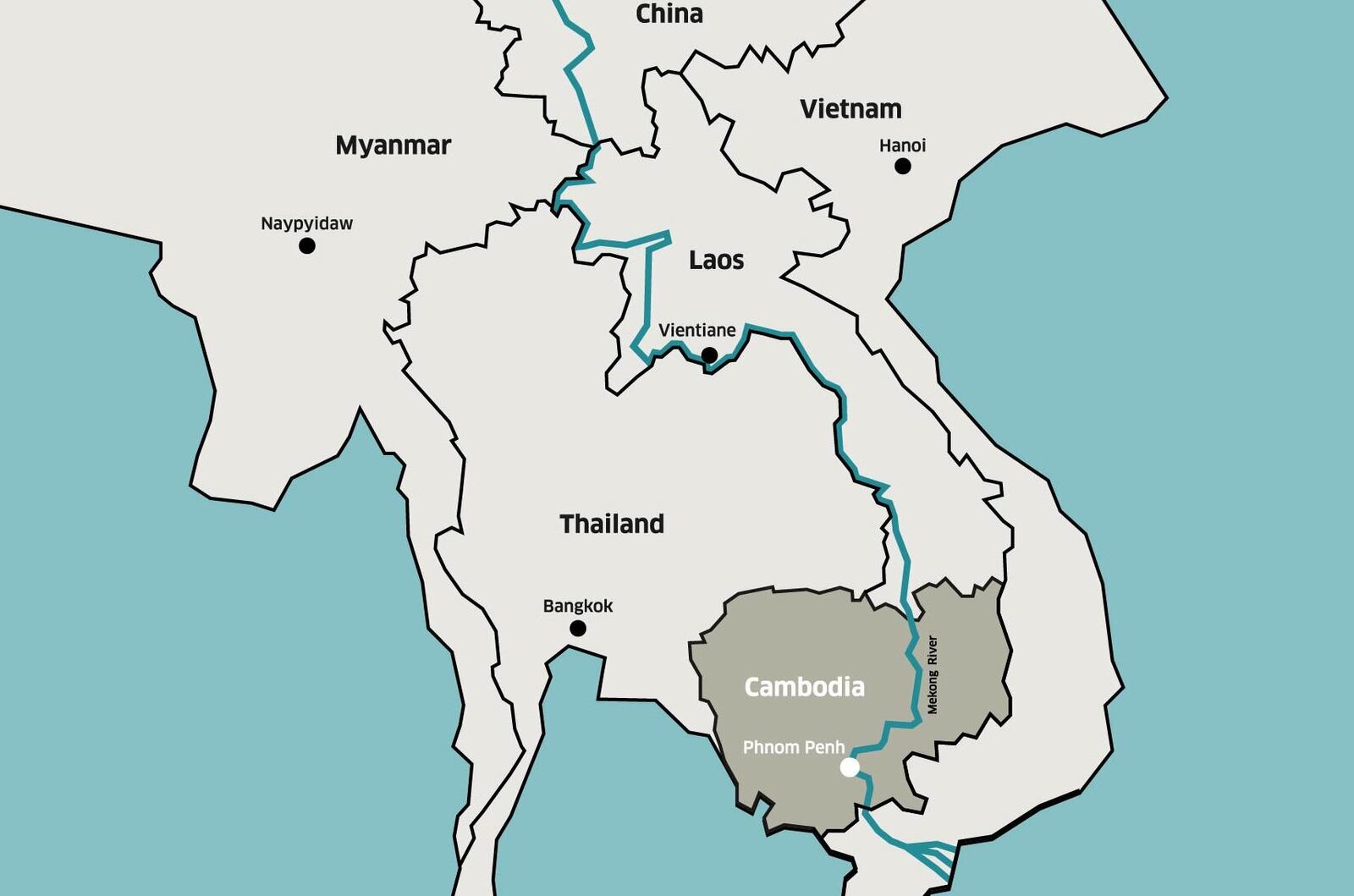Bags of help in the war on plastic waste in the ocean
The littering of the world's oceans is an enormous problem. The non-governmental organisations One Earth-One Ocean and COMPED are actively confronting this problem and ridding Cambodia's waters of waste. And Kärcher is supporting them in their efforts.
Rubbish on the water as far as the eye can see
The SeeHamster, as the waste collection boat is called, glides slowly along the banks of the Mekong. The small catamaran makes its way through the aqueous plants, or what little of them is visible. Instead, scraps of plastic bags, discarded flip-flops, drinks cans, fast-food packaging and similar man-made remnants as far as the eye can see. And it is this that the crew of six has its sights on, aboard the open-top boat with the yellow rubbish bins hanging on the railings. The five men and one woman are part of the Hot Spot Clean-up Project of the partnership between One Earth-One Ocean (OEOO) and the Cambodian Education and Waste Management Organization (COMPED). These two non-governmental organisations joined forces in 2018 to rid Cambodia's Mekong river and its tributaries of rubbish.
This is because, according to OEOO's research, the Mekong is one of the ten worst-offending rivers worldwide in terms of the plastic waste it carries to the oceans. A total of four waste collection brigades from OEOO and COMPED – made up of local employees on permanent contracts – are currently fighting against this: One in Phnom Penh, one in Battambang, one in Kampong Cham and, as of June 2022, an additional hot spot team in Phnom Penh, which was set up with the support of Kärcher. COMPED founder Detlef Gutjahr explains this team was needed because "the brigade in Phnom Penh was completely overwhelmed with the scale of waste collection. There were so many places we wanted to clean and we didn't manage to get it done." Chau Kim Heng, COMPED Team Manager, adds: "Our flexible hot spot clean-up team clears the Mekong river of plastic waste – going wherever it is needed most. It works independently of a fixed location, which means it is flexible and efficient."

Help where it is needed
On the Kah Krabay peninsula, meaning 'island of the water buffalo', between the Mekong and Bassac rivers, OEOO and COMPED established a new station for a mobile hot spot team. "This also gives the citizens of Phnom Penh the opportunity to say: 'There is rubbish in this small village on the Mekong or in that district of Phnom Penh, please help us!'," explains Detlef Gutjahr, founder of COMPED. Since the waste disposal infrastructure in Cambodia is poor, rubbish is often simply dumped on riverbanks – when the river floods, which is a regular occurrence during monsoon season from May to October, the Mekong and its tributaries wash the rubbish towards the sea.
The hot spot brigade is deployed at least four days a week. Most of the time, it consists of six permanent staff members; when there is a particularly high volume of waste, someone from another team sometimes steps in. Besides the environmental aspect, this permanent employment is a central focus of the cooperation between OEOO and COMPED in Cambodia, as Gutjahr explains: "At the rubbish dumps, you meet the poorest of the poor. They need to be able to build a future outside of the rubbish dump. Through our collaboration with OEOO, we had the opportunity to transition people into permanent employment with a monthly income." A team costs just under 37,000 euros per year. Kärcher bears the full costs of keeping the team running.
From rubbish to an energy resource
The SeeHamster is all full up for today, but the team still have work to do: They have once again filled countless bags with rubbish, averaging between 100 and 150 a day. Then it's time to load up the traditional Cambodian tuk-tuks and transport the waste to the hot spot centre on a peninsula between the Bassac river and the Mekong. Here, the team gathers, weighs, washes, dries and sorts all the rubbish, which they collect on boats such as The SeeHamster, as well as on a lorry. Within just three months of being set up, the team had collected almost eight tonnes of waste in the face of difficult conditions caused by monsoon rains.
Inside the newly built recycling plant at the hot spot station in Kah Krabay, the employees expertly separate the rubbish into different categories for further processing: Recyclable plastic waste, non-recyclable plastic waste, other recyclable and non-recyclable waste, compostable waste. This is then recycled, composted or disposed of in landfill. The plastic waste then goes to COMPED's headquarters on the other side of the Bassac river. Here, employees press the non-recyclable plastic waste into compact bales of 30 to 35 kilos. Now it is no longer waste, but rather a source of energy. Because whatever cannot be recycled is used by the Chip Mong Ecocycle Company to generate energy, Gutjahr explains: "Thermal recycling takes place in a cement works. As such, this high-calorific waste takes the place of other heating fuels such as oil or gas." To ensure that this method of processing the waste does not ultimately cause more harm to the environment than good, the emissions from the cement works are controlled and the exhaust gases are filtered.
Within the space of a month, a use is found for the ten or so tonnes of plastic waste collected by the four OEOO and COMPED teams – preventing it from ending up in our oceans. OEOO founder Günther Bonin says: "When you think that the River Yangtze, for example, flushes over 100,000 tonnes of rubbish into Asian waters every year, and One Earth-One Ocean removes 1000 tonnes over five years, it feels like a drop in the ocean. But everything we are doing is good, because we can still clean up a lot with relatively little financial input. And people in Asia and Africa are happy to have a job that earns them regular money."

The One Earth-One Ocean association was founded by Günther Bonin in 2011. Its goal is to rid waters around the world of plastic waste, as well as oil and other harmful substances. The association is also involved at a national and international level in research, education and documentation on the subject of water pollution. The association is run from its headquarters in Munich, Germany, but also has offices in Kiel (Germany), Battambang (Cambodia), Rio de Janeiro (Brazil) and Manila (Philippines). Alongside its long-term projects in Cambodia, Brazil, Indonesia, Egypt, Uganda and the Philippines, the association also organises clean-up campaigns all over the world. Kärcher has been working with OEOO to clean up Germany's North Sea and Baltic Sea coastlines since 2019. The partnership comes under the Kärcher Sustainability Strategy 2025.

The independent aid organisation Cambodian Education and Waste Management Organisation COMPED was born of the Thuringian-Cambodian Society, which was founded in 2000. The roots of this association go back to the 1980s, when Thuringia and Cambodia were linked together in socialist solidarity. COMPED was founded by three Cambodians educated in Germany with the intention of facilitating the work of the Thuringian-Cambodian Society on the ground in Cambodia. COMPED is committed to sustainable waste management in Cambodia, which it also promotes through educational programmes. For the children of families living on landfill sites, COMPED also founded kindergartens and provides them with schooling.
Plastic rubbish in the ocean
The Federal Environment Agency estimates that there are between 100 and 142 million tonnes of waste in the world's oceans, with up to ten million tonnes being added each year. The general assumption is that about 70 per cent of the waste sinks to the seabed, while the rest washes up on the beaches or floats on the water's surface. The combination of current and winds cause the rubbish to collect in specific places. One of the best known accumulations is the Great Pacific Garbage Patch. It occupies an area of 1.6 million square kilometres, making it four and a half times the size of Germany. The effects on the ecosystem are devastating, endangering the very basis of animal and human existence.

Cambodia
Cambodia is located on the Gulf of Thailand. An estimated 16.5 million people live in the Southeast Asian country, with around 1.3 million of them in the capital Phnom Penh. The official language is Khmer and the state religion is Buddhism. Cambodia's history is one marked by violence. The civil war from 1970 to 1975 was followed by Khmer Rouge rule, which claimed the lives of an estimated 1.7 million people before the Vietnamese occupation in 1979. Today, Cambodia is a constitutional monarchy with King Norodom Sihamoni as the representative head of state.










